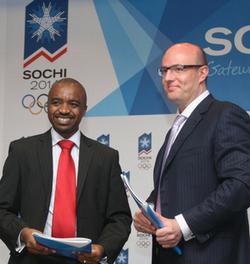 根據一項在「世界環境日」所簽署的協議內容,2014年索契冬季奧運會(Sochi Winter Olympics,簡稱Sochi 2014)將成為近年來一系列奧林匹克運動會綠色潮流中的最新賽事,而這項協議是由俄羅斯奧林匹克運動會主辦單位與聯合國環境規劃署(United Nations Environment Programme,UNEP)的官員所簽署的。
根據一項在「世界環境日」所簽署的協議內容,2014年索契冬季奧運會(Sochi Winter Olympics,簡稱Sochi 2014)將成為近年來一系列奧林匹克運動會綠色潮流中的最新賽事,而這項協議是由俄羅斯奧林匹克運動會主辦單位與聯合國環境規劃署(United Nations Environment Programme,UNEP)的官員所簽署的。
在6月5日莫斯科的簽署典禮上,UNEP的業務推展部門主任歐班(Theodore Oben)表示:「我確認今天簽署的備忘錄不會只是書面的承諾,還會確保在2014索契冬季奧運會籌備及正式展開期間,在索契市及克拉斯諾達爾(Krasnodar)地區的環境保護工作會有很大進展。」
2014索契冬季奧運會首席行政官員與總裁,同時也是索契原居民的車爾納辛克(Dmitry Chernyshenko)表示:「簽署這項重要的備忘錄將有助於確保Sochi 2014能夠在奧運會籌備的每個層面都導入環保規範的作法,並且能夠確保奧運會籌備委員會持續與國際環境專家一起支持這項行動。」
索契冬季奧運會主辦單位指出,他們計劃投資17.5億美元在能源保護管理與再生能源上,並抵減其他從使用電力、航空旅遊及地面運輸而來的溫室氣體排放量。
其他環境行動還包括發展索契市區內的綠帶,並且在索契國家公園(Sochi National Park)進行森林復育。
今年稍早,索契奧運會加入聯合國環境規劃署的「氣候平衡網絡(Climate Neutral Network)」,這個網絡是一項提升低碳經濟與低碳社會全球行動及參與的網絡,成員包含國家、城市、多國組織體、非政府組織、以及其他聯合國單位。
這個網絡計畫裡一系列的協商會議將讓國際專家們得以在奧運會之前與之後監測及分析關鍵環境指標,並將規劃環境教育行動。
索契位於黑海及俄羅斯克拉斯諾達爾地區白雪罩頂的高加索山脈之間,以其具有原始狀態而聞名。
為了保存這塊天然美景,索契市在2008年依循UNEP的建議,將高加索山自然保留區內的大雪橇(bobsleigh)與小雪橇(luge)的競賽路徑移除。這個自然保留區是一個聯合國教科文組織世界遺產,是歐洲僅存仍維持原始狀態未被人類活動干擾的山區之一。透過更改比賽場地,主辦單位強調他們被賦予創造「這個區域未來的環境遺產」的使命。
車爾納辛克在簽署協議的過程中表示:「為了未來世代,我們建立了2014索契奧運會的環境策略,這個策略可確保克拉斯諾達爾地區的生態學狀態確有改善。」
主辦單位為表章協議的簽署,在俄羅斯境內幾個地方種樹,作為UNEP的「10億棵樹行動」(Billion Trees Campaign),以及對抗氣候變遷。到目前為止,已種植超過40億棵樹,而UNEP也計劃在2009年底前設立一個目標,種植70億棵樹,使每個在地球上的人都有一顆樹。
The Sochi Winter Olympics in 2014 will be the latest in a recent series of greener Olympic Games, according to an agreement signed on World Environment Day between the Russian Olympic organizers and officials from the United Nations Environment Programme.
At the signing ceremony in Moscow June 5, Theodore Oben, chief of the UNEP's Outreach Section, said, "I am sure the memorandum signed today will not only be a written commitment, but will guarantee that during the preparation and staging of Sochi 2014 great strides are made in environmental protection in Sochi and the Krasnodar Region."
Dmitry Chernyshenko, president and chief executive of Sochi 2014 and a Sochi native, said, "Signing this important Memorandum will help ensure Sochi 2014 is able to introduce Green Standards to every level of the Games' preparation and will ensure that the Organizing Committee continues to work with international environment experts to support this."
The Sochi Olympic organizers say they plan to invest US$1.75 billion in energy conservation and renewable energy and offset the remaining greenhouse gas emissions from the use of electricity, air travel and ground transportation.
Other environmental initiatives include the development of green belts in the city and reforestation of the Sochi National Park.
Earlier this year, the Sochi Olympics joined UNEP's Climate Neutral Network, an initiative to promote global action and involvement towards low carbon economies and societies that includes countries, cities, multinationals, NGOs and other UN agencies.
A series of conferences will allow international experts to monitor and analyze key environmental indicators before and after the Games and environmental education is planned.
Sochi, situated between the Black Sea and the snow-capped Caucasus Mountains in Russia's Krasnodar Region, is renowned for its pristine setting.
In an effort to preserve this natural beauty, the city in 2008 followed UNEP's recommendation to move the bobsleigh and luge tracks away from the Caucasus nature reserve. This UNESCO World Heritage site is one of the only mountain areas in Europe that remains virtually untouched by human activity. In changing the venue, organizers stressed that they are committed to creating an "environmental legacy for the future of the region."
"We developed the Sochi 2014 environmental strategy and this will ensure that the ecological situation in the Krasnodar Region is enhanced for generations to come," said Chernyshenko at the signing of the agreement.
The organizers marked the signing of the agreement by planting trees in several locations in Russia as part of UNEP's Billion Trees Campaign, and effort to combat climate change. To date, more than four billion trees have been planted as part of the campaign, and UNEP has set a new target of seven billion trees by the end of 2009 - one for every person on the planet.



